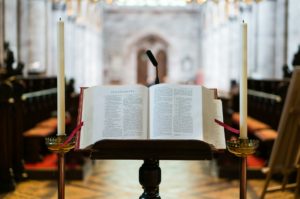Late in the fall of 374, the crowd gathered in Milan’s Great Cathedral turned their attention to Ambrose, the consular prefect of their province. Bishop Auxentius had just died, and the prefect had come to address the anxious gathering. In his usual eloquence he began to plead with the various Christian factions to put their differences aside and elect a new, strong bishop who would unite the Church—but he didn’t get far, for he was quickly interrupted—and shocked—by the call, “Ambrose for bishop!”
Ambrose (c. 339 – 397) was born around the year 340 to a prominent Christian family in Trier, Germany. His father was a successful governor in southern France, and his mother was a highly educated and pious woman. From an early age Ambrose was trained in Greek, literature, law, rhetoric, and philosophy, and was expected to follow his father in civic service. Around 372, Ambrose was appointed governor of the province of Aemilia-Liguria, with headquarters in Milan, Italy’s second capital. In Milan, Ambrose quickly showed himself to be a very capable administrator and a great orator, and he gained a reputation for impartiality and fairness.
When on that fall morning in 374 he entered the Great Church to give his speech, Ambrose thought he had come to restore order and ask for the bishops to unite the Church; he had no intention of getting into ecclesiastical politics. When the call came, “Ambrose for bishop!” Ambrose ran out of the building, not wanting any part of this, reminding everyone that he was only a catechumen.1 But the people insisted, and the governor acquiesced, for, in the oldest of Roman customs, vox populi, vox dei, “the voice of the people is the voice of God.” And so, within the span of a week’s time, Ambrose was baptized into the Church, ordained as a priest, and consecrated as a bishop.
In spite of his “irregular” beginning, or perhaps because of it, Ambrose became one of the most beloved bishops in the history of the Church and one of the four doctors2 of Western Christianity. An unparalleled writer, theologian, hymnodist, and pastor, Ambrose continued throughout his episcopacy to care both for his city and for his church. The bishop of Milan was never intimidated by either imperial authority or invading armies. When the Goths invaded his province and captured many, Ambrose gave all of his personal wealth to ransom as many as he could and even melted down the golden vessels belonging to his church to ransom many more. And when Emperor Theodosius I (379-395) massacred 7,000 people in Thessalonica in 390, Ambrose excommunicated him and forced him to perform public penance for eight months before he would ever be accepted back into communion.
Ambrose stood at the threshold of history, where the Church began moving from the margins to the center, from a persecuted minority to a powerful force not only for personal, but also for social transformation. As a bishop, it was his responsibility to God not to accommodate the emperor or the state, but to speak the truth. In one of his letters to Emperor Theodosius he said:
[I]t is not right for an emperor to refuse freedom of speech, nor is it right for a priest to refrain from saying what he knows is right. . . . The difference between good and bad rulers is that the good love liberty and the bad, servitude. There is nothing so dangerous for a priest in the eyes of God and nothing considered so base in him than that he not speak his mind freely. For it is written, “I spoke of your laws in the sight of kings and I was not confused” [Ps. 119:46]. Elsewhere, we read, “Son of man, I made you a watchman of the house of Israel, . . . ” [Ezek. 3:17].3
Today, many pastors and leaders of the Church forget their role as “watchmen over Israel” and accommodate the culture around them, trying to be “relevant,” “non-offensive.” Unlike Ambrose they forget that one of the central roles of the Church of Christ is to be the conscience of the people, of culture, and of governments. Her call is to speak openly, clearly, and without compromise, and to bring God’s message of salvation and transformation to all who hear.
Footnotes:
1 One still being trained in the Christian faith and not yet baptized.
2 So named for the great impact of their doctrine on the Catholic Church. The four—Gregory the Great, Augustine, Ambrose, and Jerome—were so designated in the early Middle Ages.
3 Ambrose, “To Theodosius, Letter 40,” The Early Church and State, in Sources of Early Christian Thought, vol. 4, ed. and trans. Agnes Cunningham (Philadelphia: Fortress Press, 1982) 87-88.




